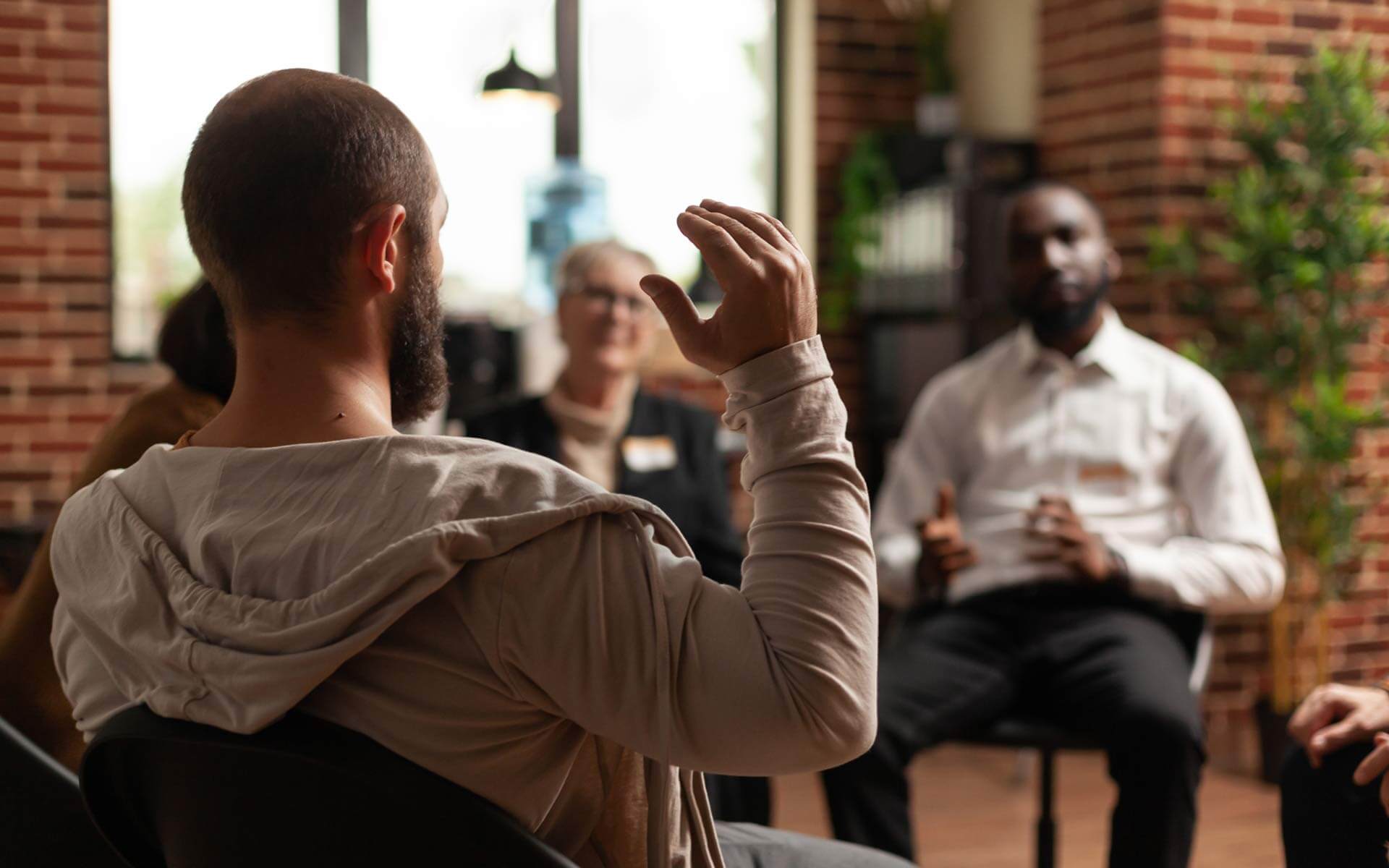Mon to Fri: 9:00am to 6:00pm
Have Questions?
Mon to Fri: 9:00am to 6:00pm
10850 Sam Black Road, Suite B, Midland, NC 28107

Imagine experiencing something so traumatic that it changes the way you see the world. The memories won’t fade, the fear won’t go away, and every day feels like a battle. An exhausting fight. Against something invisible.
This is what life feels like for someone with Post-Traumatic Stress Disorder (PTSD). The past refuses to stay in the past, but over time, that escape becomes another trap.
Let’s explore how PTSD leads to substance abuse. More importantly, let’s talk about how to break free through substance abuse treatment in Huntersville.
PTSD isn’t only bad memories. It’s an all-body sensation. Your nervous system never really rests.
Small things—a loud sound, a particular odor, or even a particular location—can cause massive fear. Your heart pounds. Your hands tremble. Your brain gets ready for danger even when it isn’t actually present.
And then there’s the emotional numbness. To protect yourself from pain, your brain starts to shut down feelings altogether. You stop enjoying things you once loved. You withdraw from relationships. Life starts to feel empty.
You’re exhausted. But sleep refuses to come. And when it does, nightmares pull you right back into the worst moments of your life.
This constant distress makes coping incredibly difficult. In desperation, many people turn to alcohol or drugs to numb the pain.
At first, substances feel like the answer. A drink can help you relax. A pill can quiet your mind. Drugs can make you forget—if only for a little while.
For a moment, the pain dulls. The memories fade. The anxiety softens.
But the relief doesn’t last.
The more you use it, the more your body adapts. You need more alcohol. More pills. Stronger drugs. Just to get the same effect.
Before you know it, you’re not using it to feel good. You’re using it just to feel normal.
And when you try to stop? The withdrawal hits hard. Anxiety surges. Sleep disappears. The trauma feels stronger than ever, or seek substance abuse treatment in Hunterville.
So, you keep using it. The cycle continues. What started as a way to cope has now created a new problem—addiction.
PTSD and substance abuse feed off each other. They create a destructive cycle.
The more you use substances, the worse your PTSD symptoms get. Alcohol disrupts sleep. Nightmares intensify. Drugs mess with brain chemistry. Anxiety and depression increase.
At the same time, PTSD makes it harder to quit. Withdrawal symptoms feel unbearable when you’re already struggling with overwhelming emotions.
So, you turn back to substances. And the cycle deepens.
Breaking free isn’t just about quitting drugs or alcohol. It’s about healing the underlying trauma. Without addressing PTSD, recovery feels impossible. So, seek substance abuse treatment in Hunterville from professionals.
The link between PTSD and addiction isn’t just psychological. It’s biological. Trauma rewires the brain. It changes how you process emotions, respond to stress, and experience pleasure.
PTSD lowers dopamine levels. It makes it harder to feel joy or motivation. It increases cortisol. It keeps your body in a constant state of stress.
Substances artificially boost dopamine. They give a temporary sense of relief. But over time, they make the brain even more dependent on external stimulation. Just to feel anything at all.
This is why self-medication feels so necessary. It’s not just about wanting to escape. It’s about the brain desperately seeking balance.
But substances don’t restore balance. They push the brain further into chaos.
To heal from PTSD and addiction, both issues must be treated together. Traditional addiction treatment alone won’t work if trauma remains unaddressed.
Effective recovery requires a dual approach. Therapy that focuses on trauma healing—such as EMDR (Eye Movement Desensitization and Reprocessing) or CBT (Cognitive Behavioral Therapy)—can help reprocess painful memories.
At the same time, medical support and structured recovery programs through substance abuse treatment in Huntersville from professionals help break substance dependence safely. It’s not just about stopping drug use. It’s about rebuilding a life where substances are no longer needed to cope.
No one should have to battle PTSD and addiction alone. Support is essential.
Family and friends play a crucial role in recovery. A strong support system provides encouragement. Accountability. Emotional stability.
For those without close support, group therapy and community programs offer connection. Sharing struggles with others who understand makes the journey less isolating.
Even professional counselors and therapists can become part of your support system. They guide you through the healing process.
If you’re struggling with PTSD and addiction, help is available. Finding the right substance abuse treatment can change everything.
The best programs understand that trauma and addiction go hand in hand. They offer therapy that addresses both conditions. They ensure a comprehensive healing process.
Substance abuse treatment should include trauma-informed counseling. Medical support. Holistic recovery options. The goal isn’t just sobriety. It’s long-term wellness.
At DeLuca Counseling, Inc., we specialize in compassionate, effective treatment. We help individuals heal at a deeper level.
If you or a loved one needs help, don’t wait. The sooner you start substance abuse treatment in Huntersville, the sooner you can begin rebuilding your life.

Drug dependance often starts as a harmless habit or stress reliever but quickly spirals out of control. What starts as occasional use can turn into a daily crutch, leading to substance abuse. When someone relies too heavily on alcohol, drugs, or even things like caffeine or nicotine to cope, it can seriously mess up their life.
Despite being fully aware of its misuse, the victims struggle to kick the habit. Awareness and education during the early stage of addiction help prevent substance abuse. Therapy and counseling are very effective measures in treating these habits.
Ways to recover from Substance Abuse:
Counseling for substance abuse helps individuals struggling with addiction to recover. Counselors provide support and guidance to help clients overcome their challenges. They use various therapeutic techniques to address the root causes of addiction.
These techniques include one-on-one sessions, group therapy, and educational workshops. The goal is to help individuals understand their addiction and develop coping strategies. They provide emotional support and encouragement throughout the process. Substance abuse counseling aims to improve overall well-being and prevent relapse of the habits.
Best Counseling Theories for Substance Abuse:
There are several counseling theories that effective for substance abuse treatment. Some of them are as follows:
Behavioral Therapies
Behavioral therapies are effective in treating substance abuse. Cognitive-behavioral therapy (CBT) is widely used. It helps clients identify and change harmful thought patterns. By focusing on developing coping strategies, CBT addresses triggers and teaches skills to manage cravings. This structured approach leads to long-term benefits.
EMDR
Eye Movement Desensitization and Reprocessing (EMDR) is a trauma-focused therapy. It helps clients process traumatic memories linked to substance abuse. EMDR involves guided eye movements. These movements help reprocess traumatic events. This therapy reduces the emotional impact of trauma. It supports overall recovery and mental health.
Motivational Therapies
Motivational therapies, like Motivational Interviewing (MI), focus on enhancing motivation. MI encourages clients to find their reasons for change. It is client-centered and non-confrontational. MI helps resolve ambivalence toward recovery. It promotes self-efficacy and commitment to treatment. This approach increases engagement and positive outcomes.
Family Counseling and Therapies
Family counseling works on the impact of substance abuse on families. It involves all family members in the recovery process. Family therapy improves communication and resolves conflicts. It strengthens family support systems. This approach enhances recovery by creating a supportive environment. It also addresses co-dependent behaviors.
12-Step Therapy
The 12-Step approach is based on the principles of Alcoholics Anonymous. It encourages participation in 12-step programs. This therapy promotes abstinence through peer support. It involves regular meetings and step work. 12-step Facilitation helps clients build a healthy network. It provides a structured framework for recovery.
Alternative & Holistic Therapies
Alternative therapies include yoga, meditation, and acupuncture. These therapies address physical and emotional well-being. Holistic approaches focus on the mind-body connection. They reduce stress and promote relaxation. These therapies complement traditional treatments. They enhance overall recovery and prevent relapse. Integrating these methods supports permanent solutions.
The Role of a Substance Abuse Counselor
Substance abuse counselors play a vital role in recovery. They provide support and guidance to individuals struggling with addiction. Counselors assess clients’ needs and develop treatment plans. They teach coping strategies to manage triggers and cravings.
Substance abuse counselors offer a non-judgmental, supportive environment. They help clients set and achieve recovery goals. Counselors provide education on the effects of substance abuse. They also connect clients with additional resources and support services.
Regular counseling sessions help monitor progress. Their ultimate goal is to help clients to come out of the unhealthy habits.
The End Goal
Counseling is the prime cause of the journey to recovery. It offers support, education, and practical strategies to the sufferer. Effective counseling helps individuals understand and overcome addiction.
Various theories and treatments enhance the recovery process. Substance abuse counselors play the main role in this journey of recovery. Their guidance and support are invaluable. By integrating these approaches, lasting recovery is achievable.
If you are in trouble or want to make anyone free from this habit you can call us immediately for expert guidance. We have the best substance abuse counselor in Charlotte, NC to solve your problem.